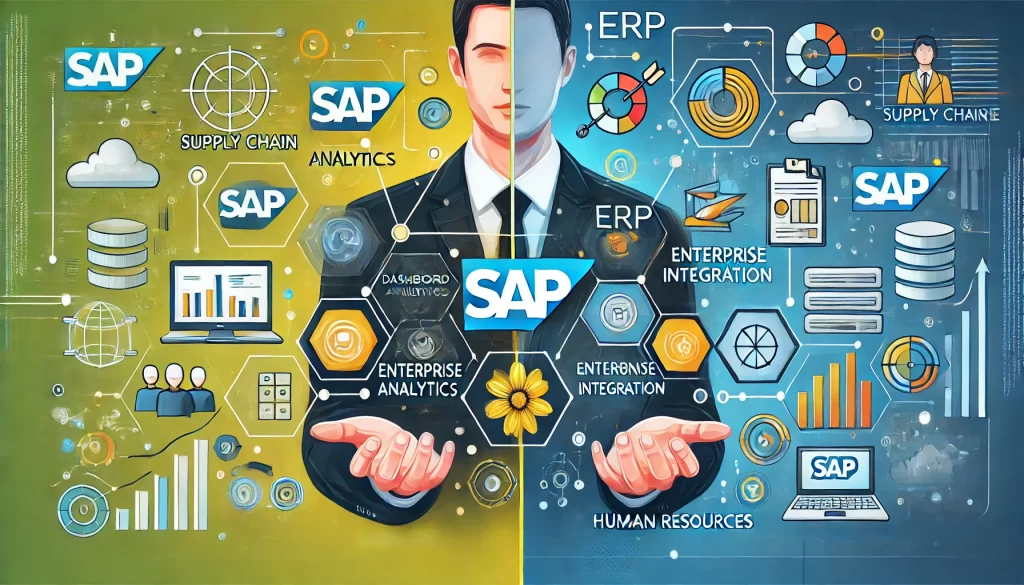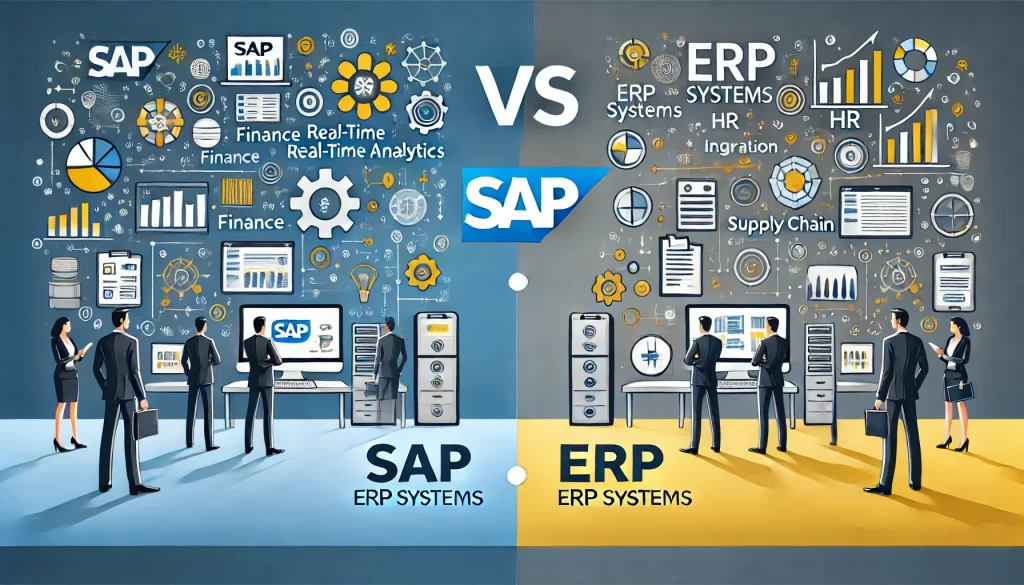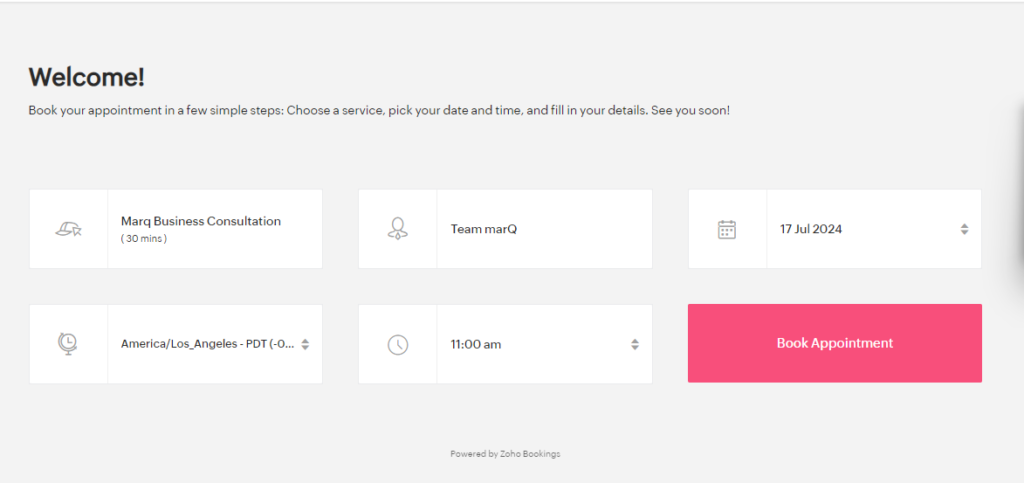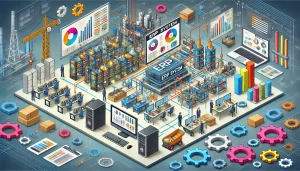SAP vs ERP Systems: Finding the Best Fit for Your Business
TABLE OF CONTENTS
- Introduction
- Understanding ERP Systems
- What is SAP?
- SAP vs. General ERP Systems
- Key Features of SAP
- Benefits of Using SAP
- ERP System Alternatives to SAP
- SAP vs. Oracle ERP
- SAP vs. Other ERP Vendors
- Factors to Consider When Choosing Between SAP and Other ERPs
- Cost Comparison: SAP vs. ERP Systems
- Implementation Process
- Customization and Scalability
- Case Studies: Businesses Using SAP
- Future Trends in ERP Systems
- Conclusion
- FAQs
Introduction
Choosing the right ERP system can be daunting, especially when comparing giants like SAP to other ERP solutions. In this article, we’ll break down the differences, benefits, and key considerations to help you decide between SAP and other ERP systems.

Understanding ERP Systems
An ERP (Enterprise Resource Planning) system is a software platform that integrates various business processes into a single, cohesive system. It streamlines operations, improves data accuracy, and enhances decision-making.
What is SAP?
SAP (Systems, Applications, and Products in Data Processing) is a leading ERP software provider known for its comprehensive solutions tailored to different industries. SAP’s robust platform supports business processes ranging from accounting and HR to supply chain management and CRM. minimizing disruption.

SAP vs. General ERP Systems
While SAP is a specific brand of ERP software, the term “ERP system” encompasses a broad range of software solutions from various vendors. SAP is renowned for its extensive capabilities, but there are many other ERP systems available, each with its unique features and benefits.

CLAIM YOUR MARKETING STRATEGY SESSION TODAY!
WE REVIEW YOUR MARKETING EFFORTS & SHOW YOU AREAS TO IMPROVE.
Key Features of SAP
SAP is packed with features designed to enhance business efficiency:
Comprehensive Integration
SAP seamlessly integrates various business functions into one platform, providing a unified view of operations.
Advanced Analytics
SAP offers powerful analytics tools that provide real-time insights, helping businesses make informed decisions.
Industry-Specific Solutions
SAP provides tailored solutions for different industries, ensuring that businesses get the specific functionalities they need.
Scalability
SAP can scale with your business, accommodating growth and evolving business requirements.
Benefits of Using SAP
Using SAP can bring numerous advantages to your business:
Improved Efficiency
Automating and integrating business processes lead to significant efficiency gains.
Enhanced Data Accuracy
Centralized data management reduces errors and ensures data consistency across the organization.
Better Decision-Making
Real-time insights and analytics support more informed and timely decision-making.
Competitive Advantage
Leveraging SAP’s advanced features can give your business a competitive edge in the market.
ERP System Alternatives to SAP
While SAP is a powerful ERP solution, other ERP systems may be a better fit depending on your business needs:
Oracle ERP
Oracle ERP offers comprehensive financial and supply chain management solutions with strong integration capabilities.
Microsoft Dynamics 365
Microsoft Dynamics 365 is known for its user-friendly interface and seamless integration with other Microsoft products.
NetSuite
NetSuite provides cloud-based ERP solutions that are particularly popular among mid-sized businesses.
Odoo
Odoo is an open-source ERP system that offers extensive customization options and affordability.
SAP vs. Oracle ERP
Comparing SAP to Oracle ERP reveals several key differences:
Functionality
Both SAP and Oracle offer comprehensive functionalities, but SAP is often favored for its deep industry-specific solutions, while Oracle is praised for its robust financial management capabilities.
User Experience
Oracle ERP generally offers a more user-friendly interface compared to SAP, which can be more complex.
Deployment Options
Both SAP and Oracle provide cloud-based and on-premise deployment options, but Oracle has been quicker to innovate in the cloud space.
SAP vs. Other ERP Vendors
SAP vs. Microsoft Dynamics 365
Microsoft Dynamics 365 is known for its easy integration with other Microsoft products, making it a good choice for businesses already using Microsoft tools. SAP, however, offers more comprehensive and scalable solutions.
SAP vs. NetSuite
NetSuite is a strong contender for mid-sized businesses looking for cloud-based ERP solutions. SAP, on the other hand, is often preferred by larger enterprises due to its extensive capabilities.
SAP vs. Odoo
Odoo offers a highly customizable and affordable alternative to SAP, particularly appealing to small businesses and startups. However, SAP’s advanced features and scalability make it more suitable for larger, more complex organizations.
Factors to Consider When Choosing Between SAP and Other ERPs
When deciding between SAP and other ERP systems, consider the following factors:
Business Size and Complexity
Larger, more complex businesses may benefit more from SAP’s comprehensive solutions, while smaller businesses might find other ERPs more cost-effective and easier to implement.
Industry Requirements
Evaluate whether the ERP system offers industry-specific solutions that meet your business needs.
Budget
Consider the total cost of ownership, including implementation, training, and ongoing maintenance.
Integration Needs
Ensure the ERP system can seamlessly integrate with your existing software and processes.

CLAIM YOUR MARKETING STRATEGY SESSION TODAY!
WE REVIEW YOUR MARKETING EFFORTS & SHOW YOU AREAS TO IMPROVE.
Cost Comparison: SAP vs. ERP Systems
ERP systems can vary widely in cost, and SAP is often at the higher end of the spectrum. However, the investment can be justified by the extensive features and scalability it offers. Other ERP systems, such as Odoo or NetSuite, may provide more affordable alternatives without sacrificing essential functionalities.
Implementation Process
Implementing an ERP system is a complex process that involves several stages:
Planning
Define your business requirements, goals, and timeline for implementation.
Data Migration
Carefully migrate existing data into the new ERP system to ensure accuracy and consistency.
Configuration and Customization
Tailor the ERP system to meet your specific business needs through configuration and customization.
Training
Provide comprehensive training to ensure your team can effectively use the new system.
Go-Live and Support
Monitor the system closely during the go-live phase and provide ongoing support to address any issues.
Customization and Scalability
One of the key advantages of SAP is its high level of customization and scalability. Businesses can tailor SAP to their specific needs and scale it as they grow. Other ERP systems, like Odoo, also offer extensive customization options, making them suitable for businesses with unique requirements.
Case Studies: Businesses Using SAP
Case Study: ABC Manufacturing
ABC Manufacturing increased production efficiency by 30% after implementing SAP’s industry-specific solutions.
Case Study: XYZ Retail
XYZ Retail improved customer satisfaction and reduced order processing times with SAP’s integrated CRM and supply chain management modules.
Case Study: LMN Services
LMN Services streamlined financial reporting and reduced operational costs by 25% using SAP’s comprehensive financial management tools.
Future Trends in ERP Systems
Stay ahead of the curve with these emerging trends in ERP systems:
AI and Machine Learning Integration
Future ERP systems will increasingly leverage AI and machine learning for predictive analytics and automated decision-making.
IoT Integration
Integrating IoT devices with ERP systems will provide real-time data and enhance operational efficiency.
Cloud Adoption
Cloud-based ERP solutions will continue to grow in popularity due to their flexibility, scalability, and cost-effectiveness.
Enhanced User Experience
ERP vendors will focus on improving user interfaces and overall user experience to increase adoption and satisfaction.
Conclusion
Choosing between SAP and other ERP systems depends on various factors, including your business size, industry requirements, and budget. While SAP offers extensive features and scalability, other ERP systems like Oracle, Microsoft Dynamics 365, NetSuite, and Odoo provide viable alternatives that may better suit certain businesses. Carefully evaluate your options and consider seeking expert advice from MARQ Networks to make an informed decision.
FAQs
ERP system integration involves connecting various business processes and applications into a unified system to streamline operations and improve efficiency.
ERP implementation services include planning, configuring, and deploying ERP systems to meet specific business requirements and goals.
ERP facilitates business process integration by automating workflows, enhancing collaboration, and ensuring data consistency across departments.
Supply chain integration in ERP systems improves visibility, efficiency, and responsiveness in managing inventory, logistics, and supplier relationships.
Optimizing financial system integration with ERP enhances accuracy in financial reporting, accelerates transaction processing, and strengthens compliance measures.
For more information and to find the right ERP solution for your business, visit MARQ Networks.
ABOUT THE AUTHOR:

Syeda Hufsa
Syeda Hufsa is the Content Creation Specialist at marQ Networks. Syeda Hufsa loves writing both personally and professionally. She graduated from reupdated university field of Computer science.



